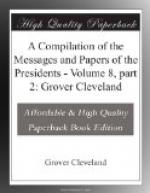The war continues. In considering the policy to be adopted for suppressing the insurrection I have been anxious and careful that the inevitable conflict for this purpose shall not degenerate into a violent and remorseless revolutionary struggle. I have therefore in every case thought it proper to keep the integrity of the Union prominent as the primary object of the contest on our part, leaving all questions which are not of vital military importance to the more deliberate action of the Legislature.
In the exercise of my best discretion I have adhered to the blockade of the ports held by the insurgents, instead of putting in force by proclamation the law of Congress enacted at the late session for closing those ports.
So also, obeying the dictates of prudence, as well as the obligations of law, instead of transcending I have adhered to the act of Congress to confiscate property used for insurrectionary purposes. If a new law upon the same subject shall be proposed, its propriety will be duly considered The Union must be preserved, and hence all indispensable means must be employed. We should not be in haste to determine that radical and extreme measures, which may reach the loyal as well as the disloyal, are indispensable.
The inaugural address at the beginning of the Administration and the message to Congress at the late special session were both mainly devoted to the domestic controversy out of which the insurrection and consequent war have sprung. Nothing now occurs to add or subtract to or from the principles or general purposes stated and expressed in those documents.
The last ray of hope for preserving the Union peaceably expired at the assault upon Fort Sumter, and a general review of what has occurred since may not be unprofitable. What was painfully uncertain then is much better defined and more distinct now, and the progress of events is plainly in the right direction. The insurgents confidently claimed a strong support from north of Mason and Dixon’s line, and the friends of the Union were not free from apprehension on the point. This, however, was soon settled definitely, and on the right side. South of the line noble little Delaware led off right from the first. Maryland was made to seem against the Union. Our soldiers were assaulted, bridges were burned, and railroads torn up within her limits, and we were many days at one time without the ability to bring a single regiment over her soil to the capital. Now her bridges and railroads are repaired and open to the Government; she already gives seven regiments to the cause of the Union, and none to the enemy; and her people, at a regular election, have sustained the Union by a larger majority and a larger aggregate vote than they ever before gave to any candidate or any question. Kentucky, too, for some time in doubt, is now decidedly and, I think, unchangeably ranged on the side of the Union, Missouri is comparatively




